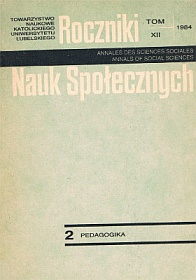Analiza porównawcza dynamiki grupowej klas szkolnych sprawiających i nie sprawiających trudności wychowawczych
Abstrakt
The present paper aims at showing correlations between the group phenomena and processes which function in school classes and educational problems occurring in them. The author took into account such group phenomena and processes as group norms, structure of the group, leadership, group climate and closeness among the students. These were compared in classes where educational problems occur and in those where such problems do not exist viewing] the comparison from the angle of concord with the optimum model of group phenomena and processes as formulated by theoreticians of education. The optimum model is characterized by:
— concord between group norms of a class and requirements laid down before the students by the teacher,
— democratic structure of the group,
— leadership in the class represented by a student or students whose influence on other students is consistent with the teacher’s educational intervention.
— high level of friendliness as characterizing the climate in the class.
The results obtained showed that classes causing educational problems differed from those not causing such problems in the fact that the former showed less favourable features of group phenomena and processes in relation to other group phenomena and processes taken into account in the paper.
Copyright (c) 1984 Roczniki Nauk Społecznych

Utwór dostępny jest na licencji Creative Commons Uznanie autorstwa – Użycie niekomercyjne – Bez utworów zależnych 4.0 Międzynarodowe.


